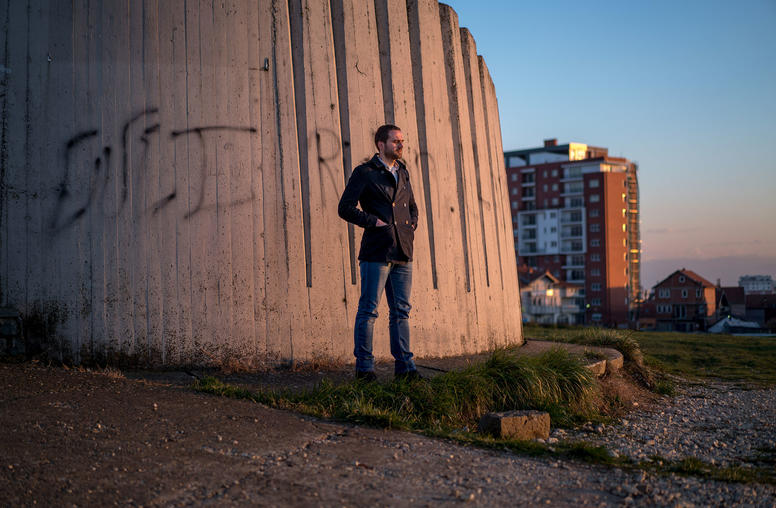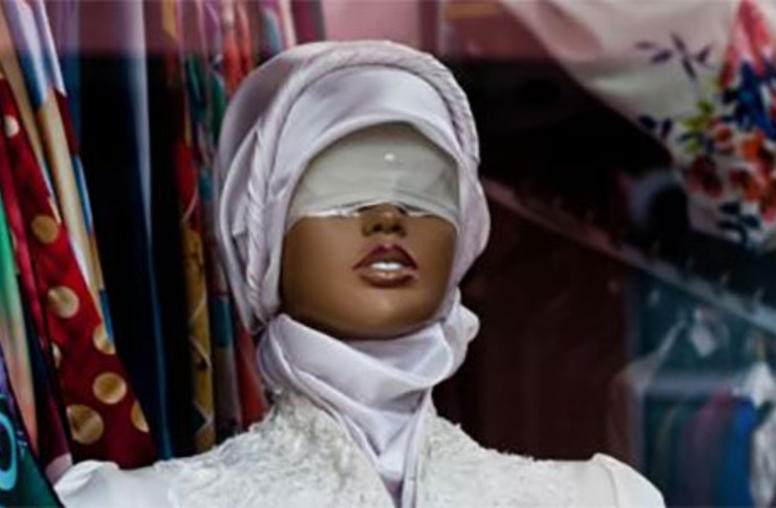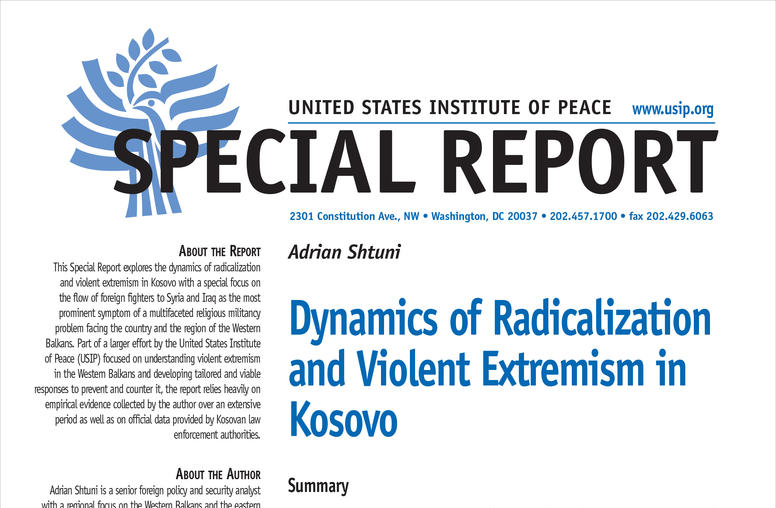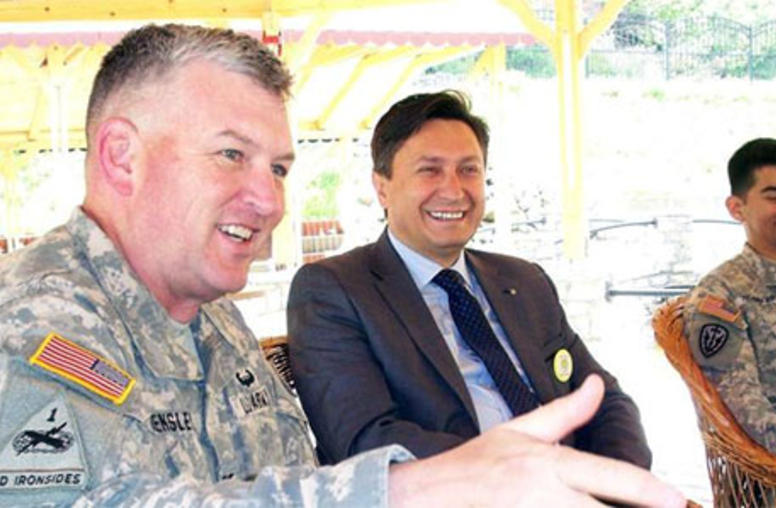Eleven years ago, Kosovo was a war zone on the world’s front pages, an ethnic and nationalistic cauldron in which both national and international laws seemed an utter irrelevance. When the guns at last fell silent, Colette Rausch worked for several years in Kosovo as part of the international community’s attempt to construct the rule of law amid the rubble. Last fall, she returned to find out whether, from the perspective of the people of Kosovo, the international community's efforts had been invaluable or in vain.
Introduction
Eleven years ago, Kosovo was a war zone on the world’s front pages, an ethnic and nationalistic cauldron in which both national and international laws seemed an utter irrelevance. When the guns at last fell silent, I worked for several years in Kosovo as part of the international community’s attempt to construct the rule of law amid the rubble. Last fall, I returned there to find out whether, from the perspective of the people of Kosovo, our efforts had been invaluable or in vain.
I journeyed to Kosovo with my Institute of Peace colleague Teuta Gashi, who had even more reason than I did to want to talk to the people: Teuta is not only a veteran of NATO and United Nations missions to the area, she was born and raised in Kosovo.
Teuta and I traveled as part of an ongoing Institute project called "Voices from the Field: Rule of Law through the Eyes of the People." The Voices project gathers personal stories of people from around the world who have lived through war and are dealing with its aftermath. From Nepal to Nicaragua, the Voices team interviews soldiers and civilians, officials and rebels, U.N. staffers and nongovernmental organization (NGO) activists to get their candid opinions on the country’s legal and security systems, to hear their often harrowing personal experiences of conflict, and to discover what the rule of law means to them.
- An Outsider's View: A Barometer of Our Hopes
- The View from the Inside: Disappointment Below the Appearances
- Still some Cause for Hope
- Inspiration even from Desolation
- A Work in Progress
An Outsider’s View: A Barometer of Our Hopes
In the late 1990s, Serb forces fought a war with the Kosovo Liberation Army (KLA), a secessionist rebel movement. Hundreds of thousands of people were eventually displaced and about ten thousand killed. A three-month NATO bombing campaign in spring 1999 resulted in the expulsion of Serb forces from Kosovo. NATO forces moved into the province to provide security while various international organizations set up operations. I first entered Kosovo a few weeks after NATO forces arrived and then spent the next few years of my life working there, first with the U.S. Justice Department, then with the Organization for Security and Cooperation in Europe, and then with the Institute of Peace. My work focused on strengthening rule of law by introducing new legislation geared to Kosovo’s problems, training judges and prosecutors, and monitoring the justice system.
 Kosovo has occupied a special place in my heart over the past ten years. For most people outside the Balkans, Kosovo’s newsworthiness has slipped into the shadows of subsequent conflicts. But for those of us who lived there in the very early years of the international intervention, this small territory (which declared itself an independent state in February 2008) continues to loom large in our thoughts. (Photo: a bombed out building in Pristina approximately 10 years ago)
Kosovo has occupied a special place in my heart over the past ten years. For most people outside the Balkans, Kosovo’s newsworthiness has slipped into the shadows of subsequent conflicts. But for those of us who lived there in the very early years of the international intervention, this small territory (which declared itself an independent state in February 2008) continues to loom large in our thoughts. (Photo: a bombed out building in Pristina approximately 10 years ago)
Sometimes I wonder why this landlocked Balkan country, roughly the size of the state of Connecticut, exerts such a powerful hold over us. Part of the answer is surely that many of the rule of law issues we have grappled with in Afghanistan and Iraq we first encountered in Kosovo. But a larger part of the answer is that Kosovo has been a barometer of our hopes for the rule of law generally. When we arrived there we had a strong commitment to our mission and a firm conviction that all the resources and attention pouring into Kosovo would make a difference, would help transform a war-ravaged country into a society in which peace and rule of law could rein. A decade later, it is clear that we did not achieve all that we expected in Kosovo. It is still a work in progress. It has proved to be a rich source of lessons for peacebuilders elsewhere, but those lessons have often not been heeded or even recognized.
Yet, while Kosovo has been the grave of our naiveté, it has also been the birthplace of a more realistic - but not cynical - outlook. It has taught us not to expect a perfect outcome in peacebuilding efforts. It has taught us that peacebuilding is a long, hard slog punctuated by unexpected crashes, reversals, stops, and starts. More positively, it has also taught us that what may seem like stagnation might actually be a chance for consolidation of progress achieved; that what feels like a setback may actually trigger a tipping point, after which progress will be swift and substantial.
All in all, then, Kosovo has been a mixed blessing for us outsiders. It has dimmed, but not extinguished, our bright hopes for building the rule of law in societies emerging from conflict; it has made us wiser, but hardly infallible, judges of what it takes to do so.
But what about the insiders? How does the ten-year struggle to establish the rule of law within Kosovo looks to Kosovars? Do they believe that they now live in a society where rule of law matters? Do they feel that the crimes committed during the war years have been dealt with justly? Are they hopeful about the future?
The View from the Inside: Disappointment below the Appearances
Teuta met me at the airport in Pristina and we set out straightaway for the first of the thirty interviews we were to conduct over the next seven days in the capital and other locations.
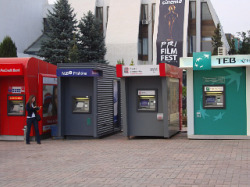 It immediately struck me that calculating the progress Kosovo has achieved depends upon where you sit. In Pristina, I was startled by the tremendous amount of building and rebuilding that has taken place since I was last there. Downtown Pristina today has the buzz of a European small city. A pedestrian area closed off to cars has been developed. Surrounding streets are lined with many outdoor cafes, modern hip restaurants, and boutiques stocked with cool fashions. It was hard orienting myself, because the city is so different from what I remembered: a gloomy, shabby downtown area pockmarked with bombed-out buildings as a constant reminder of the conflict. A row of ATM machines from various banks now stands in a neat line in one of Pristina’s plazas; there had not been a single ATM machine in Kosovo during my tenure there. I remembered always having to carry (or hide at home) hundreds of dollars to pay my rent and other expenses. It was purely a cash economy back then and an ATM would have come in handy. (Photo: row of ATMs in Pristina)
It immediately struck me that calculating the progress Kosovo has achieved depends upon where you sit. In Pristina, I was startled by the tremendous amount of building and rebuilding that has taken place since I was last there. Downtown Pristina today has the buzz of a European small city. A pedestrian area closed off to cars has been developed. Surrounding streets are lined with many outdoor cafes, modern hip restaurants, and boutiques stocked with cool fashions. It was hard orienting myself, because the city is so different from what I remembered: a gloomy, shabby downtown area pockmarked with bombed-out buildings as a constant reminder of the conflict. A row of ATM machines from various banks now stands in a neat line in one of Pristina’s plazas; there had not been a single ATM machine in Kosovo during my tenure there. I remembered always having to carry (or hide at home) hundreds of dollars to pay my rent and other expenses. It was purely a cash economy back then and an ATM would have come in handy. (Photo: row of ATMs in Pristina)
So, to an outsider wandering through Pristina, Kosovo seems to be doing much better economically. But our interviewees told a different story. They spoke of corrupt government officials who use their illegal income to build businesses and provide jobs for their supporters. Frustrated youngsters complained that they were denied educational and economic opportunities unless they were part of Kosovo’s elite.
Everyone, young or old, was disappointed that after more than ten years of sustained international involvement, more had not been achieved. They criticized both Kosovo’s leaders and the international community for being more concerned with their own interests than with those of the country as a whole. The international community was condemned not only for doing too little (in terms of standing up to corrupt politicians with links to organized crime) but also for doing too much (such as retaining too many positions in the national government rather than turning them over to Kosovars and neglecting local capacity building).
Still Some Cause for Hope
A trip to a Serb village provided a glimpse into the complexity of historical and present day relations between Kosovo Serbs and Kosovo Albanians, as well as between Kosovo Serbs and the Belgrade government.
Outside the villages and enclaves that have always been composed primarily of Serbs, there were places and a time when many Kosovo Serbs and Kosovo Albanians grew up together and lived side by side without incident. They went to school together and socialized together. This changed with Slobodan Milosevic’s efforts to drive a wedge between the two groups. Seeking to exert more control over the province, Milosevic encouraged Serbs with no historic ties to Kosovo to move there. When the war broke out, some of these newcomers, as well as some Serbs who had lived for generations in Kosovo, engaged in violence against Kosovo Albanians. Most of these Serbs fled Kosovo after the war. Those Serbs who stayed were caught between extremists on the Albanian side who wanted to use violence and intimidation to push all Serbs out, and nationalists on the Serb side in Serbia, who not only used violence and threats in an attempt to keep control of Kosovo, but also used Kosovo Serbs as political pawns.
After the war, there were Kosovo Serbs who wanted nothing more than to stay in Kosovo and live peacefully with their Kosovo Albanian neighbors. We spoke with a Serb police commander who did just that. He joined the Kosovo Police Service and worked alongside his Kosovo Albanian colleagues for years. However, he eventually ran into trouble from parallel Serb police forces that operated in Kosovo and monitored his activities. The nationalists in Belgrade sought to deter Kosovo Serbs from cooperating with the international community. He was threatened by nationalists when he refused to resign his post after Kosovo declared its independence from Serbia. When asked what rule of law meant to him, he said it means equal rights for everyone and respect of international human rights. As a police officer, he said that it is his goal to apply the rule of law equally to everyone.
Another case of a Serb who considers Kosovo home and refuses to buy into the ethnic divide was a soft-spoken Serb actor in his early twenties with whom we met; he fled Kosovo right after the war at his parents’ insistence after his family had been confronted by armed Albanians. Upon finishing school in Serbia two years later, he felt compelled to return to the place he still considered home. He moved back and found himself isolated and bored, living in a village that had no electricity much of the time and nothing to do all of the time. So one day he was talking with a friend and they decided to create a youth theater group.
Over time, word of the theater spread and the group began performing in various parts of Kosovo. They were invited to perform in Bosnia last summer but did not have the funds to travel there. He said that he hopes the international community will pay attention to youth because young people are very creative and can make something from nothing, just like he and his friends did. He wishes less attention were paid to politics and ethnic division. He is proud to be able to use his art to promote peace and reconciliation.
When asked what rule of law means to him, he said it is something that he has never seen in Kosovo, but he was optimistic that it would develop there soon. Although uncertain of the precise definition of "rule of law," he declared that he understands it to mean that everyone has to respect the law, which is written by the constitutional authority.
Inspiration Even from Desolation
Our travels took us to Junik, the biggest village in Kosovo. Junik had been a KLA stronghold and the site of heavy fighting throughout the conflict. In 1998, Richard Holbrooke had traveled to Junik to meet with the KLA in an attempt to negotiate a ceasefire and initiate talks between the KLA and Belgrade. The KLA rejected any ceasefire or negotiations. Just weeks before Holbrooke arrived in Junik, it had been bombed by Serb military aircraft, killing a hundred Kosovo Albanians and four Serb policemen, and prompting thousands of villagers to flee the area. Later that year, Serb forces took control of Junik from the KLA.
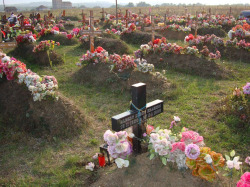 On April 27, 1999, reportedly in retaliation for a KLA attack, Serb forces swept villages from Decani to Junik, driving people out of their homes. We met with a group of women who had been part of a convoy fleeing Junik. The convoy had been halted by Serb paramilitary forces, who separated the men and older boys from the women and younger children, and then ordered the convoy to move on. Not until recently, when mass graves in Serbia were unearthed, did many of the widows and children learn of the fate of their husbands, fathers, and brothers. (Photo: mass graves in Junik)
On April 27, 1999, reportedly in retaliation for a KLA attack, Serb forces swept villages from Decani to Junik, driving people out of their homes. We met with a group of women who had been part of a convoy fleeing Junik. The convoy had been halted by Serb paramilitary forces, who separated the men and older boys from the women and younger children, and then ordered the convoy to move on. Not until recently, when mass graves in Serbia were unearthed, did many of the widows and children learn of the fate of their husbands, fathers, and brothers. (Photo: mass graves in Junik)
When Teuta and I first met with the women, we sat together in the living room and exchanged pleasantries. They asked about me and my family. I showed them photos of my husband and 6-year-old son. They smiled and blessed my photos. As we grew closer to beginning the interviews, however, emotions bubbled to the surface, and the women grew uncomfortable at the thought of crying in one another’s presence. We decided to conduct the interviews individually, and moved to a bedroom where we sat on a large lamb’s-wool rug on the floor and spoke with each of the women one by one.
One widow, who has dressed only in black these past ten years, spoke of the checkpoint stop where she saw her 13-year-old son being taken away with his father. Convinced they were being taken to their deaths, she fainted and fell into shock. When she awoke later on the journey to Albania she discovered that her son had been spared because he was small in stature and because, after the paramilitary forces learned that none of the women could drive the truck, they incorrectly assumed he knew how to do so. He climbed into the driver’s seat and did the best he could, in the process saving his own life as well as those of the women and other children.
In more than 10 years, this was the first time anyone had asked these women how they felt and their views on what had happened to them. The rawness of the women’s emotions was so overwhelming at times that we needed to stop the sessions for both interviewees and interviewers to recover. It was particularly difficult for Teuta, who learned during one of the interviews that someone she knew from childhood had been taken away from the convoy and killed with the others.
After the interviews, we all gathered together again and shared hugs and burek (a pie made of phyllo dough, spinach, and cheese). One of the widows asked us to visit the graveyard where, after being exhumed from a mass grave in Serbia, the boys and men had been reburied. We drove in silence for about half an hour and then we saw it: a field with row upon row of raised graves covered in flowers and identified with markers bearing names, photos, birthdates and dates of death. We walked with the widow to the graves of her husband and son. We watched as she cleaned off their photos and then paused at her son’s grave to kiss his photo. As we turned to go back, she grabbed my arm and we walked back to the car. She told me along the way that she would not cry because she did not want us to suffer by feeling her pain.
In Junik we saw most starkly the contrast between Kosovo’s dark past and brighter present. Thanks to remittances from relatives living elsewhere in Europe, most of the village has been rebuilt after having been razed by Serb paramilitary forces.
The emotional desolation of Junik’s war widows shows that some things cannot be so easily fixed, yet the strength of the women was inspiring. Despite everything they had gone through, they had not succumbed to despair; for the sake of the lives of their remaining children, they would not let the past overshadow the future. I was also moved by their kindness. They kept thanking us for meeting with them and saying how honored they were to have hosted us. I felt that it was the two of us who had been honored.
A Work in Progress
Kosovo, as its people know only too well, has a long way to go before it becomes a country that abides by the rule of law. Outsiders may be struck by signs of economic progress and physical reconstruction, but insiders are more concerned about what has not been achieved in the past ten years, especially in terms of establishing a legal and political system that treats all Kosovars equally.
Yet, insiders and outsiders alike can surely take heart from the fact that the appetite for rule of law in Kosovo is strong at least among its ordinary citizens. Everyone we interviewed affirmed the importance to them of rule of law in one form or another. For the youths in Pristina, rule of law means that government leaders will not exploit their position to enrich themselves, their families, and cronies. For the Serbs whom we interviewed, it means everyone follows the law, which is equally applied to all. For the widows, rule of law means that those responsible for murdering their loved ones will be held to account, and that compensation will be provided to the widows and their children.
For me, after all these years, the rule of law in Kosovo is clearly still a work in progress. Kosovo has taught and continues to teach the international community at least as many lessons in peacebuilding as the international community has taught it. Not the least of these lessons is that everyone has to play their part before rule of law can take hold: citizens must adhere to and hold their leaders accountable to the principles of rule of law; leaders must respect the rule of law and take account of the rights and aspirations of their citizens; and the international community must remain committed to establishing rule of law over the long term, pressing the country’s leadership for good governance while ensuring that the representatives of the international community are themselves accountable and committed to the people they have come to serve in Kosovo.
